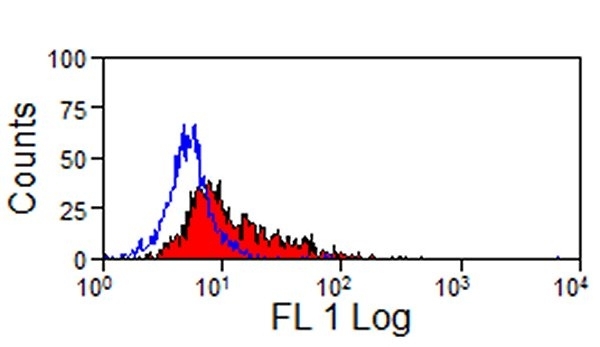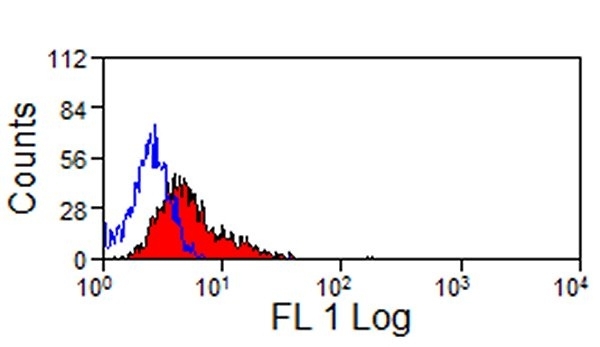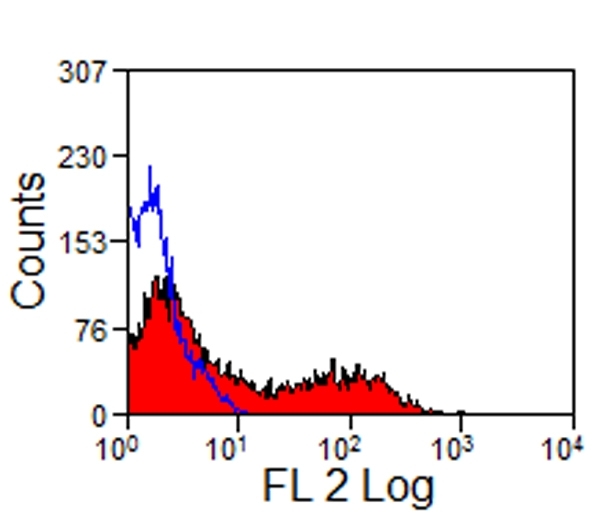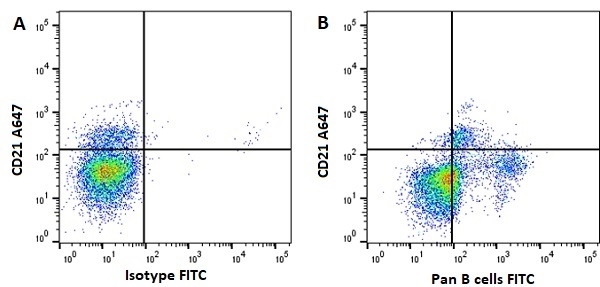Pan B-Cells antibody | CVS36




Mouse anti Horse Pan B-Cells:FITC
- Product Type
- Monoclonal Antibody
- Clone
- CVS36
- Isotype
- IgG1
- Specificity
- Pan B-Cells
| Mouse anti Horse Pan B-Cells, clone CVS36 is a monoclonal antibody directed against equine Ig light chains. Mouse anti Horse Pan B-Cells, clone CVS36 binds 100% of CD5-ve peripheral blood lymphocytes and recognized all equine B-cells (Lunn et al. 1998) As the antigen recognized by clone CVS36 appears to be present on the surface of all equine B-cells it is therefore is a reagent that can be used as a pan B-cell marker for domestic horses (Breathnach et al. 2005). Specific anti equine reagents have yet to be fully characterized for the typically recognized B-cell makers such as CD19, CD20, CD21, CD22 and CD79. While testing has demonstrated the cross reactivity of some monoclonal B-cell markers raised against other species with equine B cells, such as the Mouse anti Human CD79a antibody, (clone HM57), an overview of which may be found in the report of the second equine leucocyte antigen workshop (Lunn et al. 1998). With specificity for equine Ig light chains, clone CVS36 may be used to detect all equine immunoglobulin classes and subclasses in ELISA applications (Lunn et al. 1998). |
- Target Species
- Horse
- Product Form
- Purified IgG conjugated to Fluorescein Isothiocyanate Isomer 1 (FITC) - liquid
- Preparation
- Purified IgG prepared by affinity chromatography on Protein G from tissue culture supernatant
- Buffer Solution
- Phosphate buffered saline
- Preservative Stabilisers
- 0.09% sodium azide (NaN3)
1% bovine serum albumin - Immunogen
- Purified Equine Ig.
- Approx. Protein Concentrations
- IgG concentration 0.1 mg/ml
- Fusion Partners
- Spleen cells from immunised Balb/c mice were fused with cells of the X63-Ag8.653 myeloma cell line.
- Max Ex/Em
-
Fluorophore Excitation Max (nm) Emission Max (nm) FITC 490 525 - Regulatory
- For research purposes only
- Guarantee
- 12 months from date of despatch
Avoid repeated freezing and thawing as this may denature the antibody. Storage in frost-free freezers is not recommended.
| Application Name | Verified | Min Dilution | Max Dilution |
|---|---|---|---|
| ELISA | |||
| Flow Cytometry | Neat | 1/10 |
- Flow Cytometry
- Use 10μl of the suggested working dilution to label 1x106 cells in 100μl
| Description | Product Code | Applications | Pack Size | List Price | Your Price | Quantity | |
|---|---|---|---|---|---|---|---|
| Mouse anti Horse Pan B-Cells | MCA1899GA | E F | 0.1 mg |
|
Log in | ||
| List Price | Your Price | ||||||
|
|
Log in | ||||||
| Description | Mouse anti Horse Pan B-Cells | ||||||
| Mouse anti Horse Pan B-Cells:RPE | MCA1899PE | E F | 100 Tests | Log in | |||
| List Price | Your Price | ||||||
| Log in | |||||||
| Description | Mouse anti Horse Pan B-Cells:RPE | ||||||
References for Pan B-Cells antibody
-
Lunn, D.P. et al. (1998) Report of the Second Equine Leucocyte Antigen Workshop, Squaw valley, California, July 1995.
Vet Immunol Immunopathol. 62 (2): 101-43. -
Tomlinson, J.E. et al. (2018) Multispectral fluorescence-activated cell sorting of B and T cell subpopulations from equine peripheral blood.
Vet Immunol Immunopathol. 199: 22-31. -
Cequier, A. et al. (2022) Equine Mesenchymal Stem Cells Influence the Proliferative Response of Lymphocytes: Effect of Inflammation, Differentiation and MHC-Compatibility.
Animals (Basel). 12 (8): 984.
Further Reading
-
Lunn, D.P. et al. (1991) Three monoclonal antibodies identifying antigens on all equine T lymphocytes, and two mutually exclusive T-lymphocyte subsets.
Immunology. 74 (2): 251-7. -
Sheoran, A.S. et al. (1998) Monoclonal antibodies to subclass-specific antigenic determinants on equine immunoglobulin gamma chains and their characterization.
Vet Immunol Immunopathol. 62 (2): 153-65.
MCA1899F
If you cannot find the batch/lot you are looking for please contact our technical support team for assistance.
Please Note: All Products are "FOR RESEARCH PURPOSES ONLY"
View all Anti-Horse ProductsAlways be the first to know.
When we launch new products and resources to help you achieve more in the lab.
Yes, sign me up


